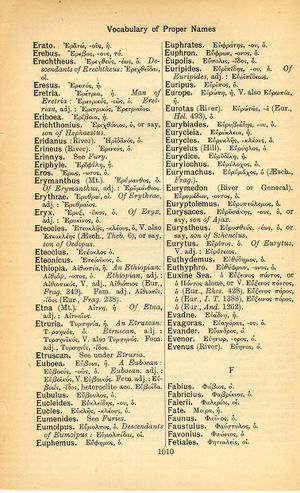Eretria: Difference between revisions
ἰχθύς ἐκ τῆς κεφαλῆς ὄζειν ἄρχεται → the fish stinks from the head, a fish rots from the head down, the fish rots from the head down, fish begin to stink at the head, the fish stinks first at the head, corruption starts at the top, the rot starts at the top
(D_3) |
|||
| Line 8: | Line 8: | ||
{{Lewis | {{Lewis | ||
|lshtext=<b>Ĕrĕtrĭa</b>: ae, f., = Ἐρετρία.<br /><b>I</b> The [[principal]] [[city]] on the [[island]] of [[Euboea]], the birthplace of the [[philosopher]] [[Menedemus]], [[now]] Palaeo Castro, Plaut. Merc. 3, 4, 59; Mel. 2, 7, 9; Plin. 4, 12, 21, § 64; Cic. Ac. 2, 42; Liv. 32, 16; 35, 38 al.—<br /> <b>B</b> Derivv.,<br /> <b>1</b> Ĕrĕtrĭus, a, um, adj., Eretrian: [[creta]], Plin. 33, 13, 57, § 163; so, [[terra]], Cels. 5, 15; 6, 3.—Subst.: [[Eretria]], ae, f., Plin. 35, 6, 21, § 38; Vitr. 7, 14.—<br /> <b>2</b> Ĕrĕtrĭ-[[ensis]], e, adj., of [[Eretria]]: Gongylus, Nep. Paus. 2.—Subst., Ĕrĕtrienses, ium, m., the inhabitants of [[Eretria]], Liv. 35, 38.—<br /> <b>3</b> Ĕrĕtrĭăci, ōrum, m., philosophers of the [[school]] of [[Menedemus]], Cic. Ac. 2, 42, 109. —Also called,<br /> <b>4</b> Ĕrĕtrĭci, ōrum., m., Cic. de Or. 3, 17; Sen. Ep. 88 fin.—In sing.: Ĕrĕtrĭcus, an Eretrian [[philosopher]], Cic. Tusc. 5, 39.—<br /><b>II</b> A [[city]] of [[Thessaly]], in Phthiotis, [[now]] Tzangli, Liv. 32, 13; 33, 6. | |lshtext=<b>Ĕrĕtrĭa</b>: ae, f., = Ἐρετρία.<br /><b>I</b> The [[principal]] [[city]] on the [[island]] of [[Euboea]], the birthplace of the [[philosopher]] [[Menedemus]], [[now]] Palaeo Castro, Plaut. Merc. 3, 4, 59; Mel. 2, 7, 9; Plin. 4, 12, 21, § 64; Cic. Ac. 2, 42; Liv. 32, 16; 35, 38 al.—<br /> <b>B</b> Derivv.,<br /> <b>1</b> Ĕrĕtrĭus, a, um, adj., Eretrian: [[creta]], Plin. 33, 13, 57, § 163; so, [[terra]], Cels. 5, 15; 6, 3.—Subst.: [[Eretria]], ae, f., Plin. 35, 6, 21, § 38; Vitr. 7, 14.—<br /> <b>2</b> Ĕrĕtrĭ-[[ensis]], e, adj., of [[Eretria]]: Gongylus, Nep. Paus. 2.—Subst., Ĕrĕtrienses, ium, m., the inhabitants of [[Eretria]], Liv. 35, 38.—<br /> <b>3</b> Ĕrĕtrĭăci, ōrum, m., philosophers of the [[school]] of [[Menedemus]], Cic. Ac. 2, 42, 109. —Also called,<br /> <b>4</b> Ĕrĕtrĭci, ōrum., m., Cic. de Or. 3, 17; Sen. Ep. 88 fin.—In sing.: Ĕrĕtrĭcus, an Eretrian [[philosopher]], Cic. Tusc. 5, 39.—<br /><b>II</b> A [[city]] of [[Thessaly]], in Phthiotis, [[now]] Tzangli, Liv. 32, 13; 33, 6. | ||
}} | |||
{{Gaffiot | |||
|gf=<b>Ĕrĕtrĭa</b>,¹⁶ æ, f. (Ἐρετρία), Érétrie<br /><b>1</b> [ville de l’Eubée, [[patrie]] du [[philosophe]] Ménédème] : Cic. Ac. 2, 129 || <b>-trĭus</b>, a, um, (<b>-trĭēnsis</b>, e), Érétrien, d’Érétrie : Plin. 33, 163 ; Nep. Paus. 2, 2 || <b>-triăcī</b> (<b>-trĭcī</b>), ōrum, m., les disciples de Ménédème : Cic. Ac. 2, 109 ; de Or. 3, 62 || <b>-triēnsēs</b>, ium, m., habitants d’Érétrie : Liv. 35, 38, 4<br /><b>2</b> ville de Thessalie : Liv. 32, 13, 9 ; 33, 6, 10. | |||
}} | }} | ||
Revision as of 06:53, 14 August 2017
English > Greek (Woodhouse)
Ἐρέτρια, ἡ.
Man of Eretria: Ἐρετριεύς, -ιῶς, ὁ.
Eretrian, adj.: Ἐρετρικός, Ἐρετριαῖος.
Latin > English (Lewis & Short)
Ĕrĕtrĭa: ae, f., = Ἐρετρία.
I The principal city on the island of Euboea, the birthplace of the philosopher Menedemus, now Palaeo Castro, Plaut. Merc. 3, 4, 59; Mel. 2, 7, 9; Plin. 4, 12, 21, § 64; Cic. Ac. 2, 42; Liv. 32, 16; 35, 38 al.—
B Derivv.,
1 Ĕrĕtrĭus, a, um, adj., Eretrian: creta, Plin. 33, 13, 57, § 163; so, terra, Cels. 5, 15; 6, 3.—Subst.: Eretria, ae, f., Plin. 35, 6, 21, § 38; Vitr. 7, 14.—
2 Ĕrĕtrĭ-ensis, e, adj., of Eretria: Gongylus, Nep. Paus. 2.—Subst., Ĕrĕtrienses, ium, m., the inhabitants of Eretria, Liv. 35, 38.—
3 Ĕrĕtrĭăci, ōrum, m., philosophers of the school of Menedemus, Cic. Ac. 2, 42, 109. —Also called,
4 Ĕrĕtrĭci, ōrum., m., Cic. de Or. 3, 17; Sen. Ep. 88 fin.—In sing.: Ĕrĕtrĭcus, an Eretrian philosopher, Cic. Tusc. 5, 39.—
II A city of Thessaly, in Phthiotis, now Tzangli, Liv. 32, 13; 33, 6.
Latin > French (Gaffiot 2016)
Ĕrĕtrĭa,¹⁶ æ, f. (Ἐρετρία), Érétrie
1 [ville de l’Eubée, patrie du philosophe Ménédème] : Cic. Ac. 2, 129

